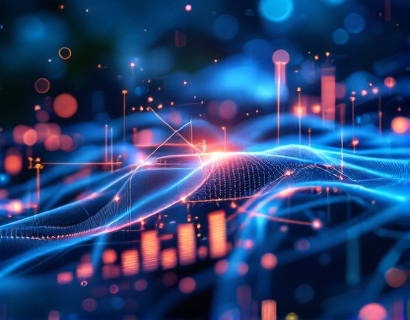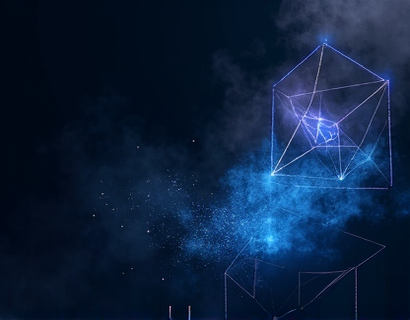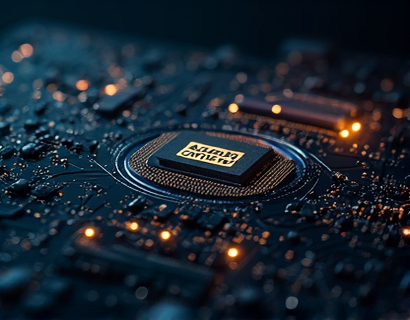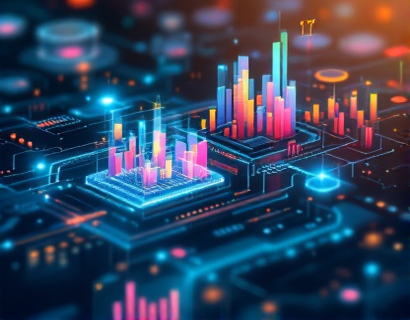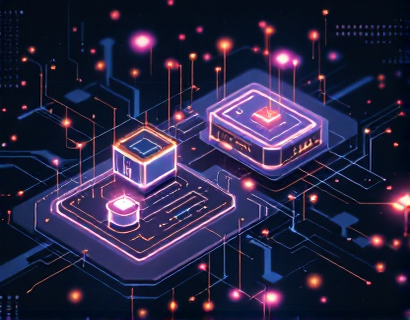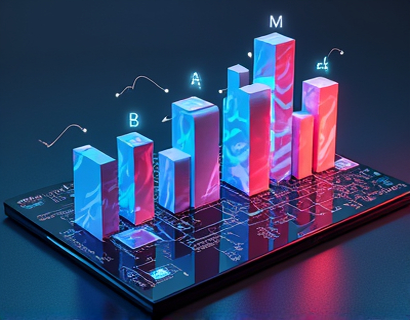Blockchain Oracle Management: Streamlining Data Integration and Enhancing Smart Contracts for Decentralized Applications
In the rapidly evolving landscape of blockchain technology, the integration of reliable data sources is crucial for the functionality and success of decentralized applications (dApps). Blockchain oracle management plays a pivotal role in this process by acting as a bridge between the blockchain and external data sources. This comprehensive guide delves into the intricacies of advanced oracle management and smart contract solutions, focusing on how these technologies streamline data integration and enhance the overall security and efficiency of dApps. By understanding and implementing these solutions, developers and businesses can unlock the full potential of blockchain, ensuring real-time, secure, and reliable interactions within decentralized ecosystems.
Understanding Blockchain Oracles
Blockchain oracles are intermediary services that provide blockchain networks with external data and allow smart contracts to interact with off-chain information. These oracles are essential because blockchains, by design, are isolated environments that do not have direct access to external data. Without oracles, smart contracts would be limited to the data and functions available on the blockchain, severely restricting their utility and applicability.
Oracles can be categorized into two main types: centralized and decentralized. Centralized oracles rely on a single entity to provide data, which can introduce single points of failure and trust issues. Decentralized oracles, on the other hand, use a network of nodes to gather and validate data, enhancing reliability and security. Decentralized oracles are preferred in most blockchain applications due to their robustness and resistance to manipulation.
Challenges in Data Integration
Integrating data from external sources into blockchain applications presents several challenges. One of the primary issues is the variability and reliability of external data. External data sources can be inconsistent, delayed, or even malicious, which can compromise the integrity of smart contracts. Additionally, the heterogeneity of data formats and protocols adds another layer of complexity. Ensuring that data is accurately and efficiently translated into a format usable by smart contracts is a non-trivial task.
Another significant challenge is the latency associated with data retrieval. Smart contracts often require real-time or near-real-time data to function effectively. Delays in data transmission can lead to outdated information being used in contract executions, resulting in incorrect outcomes. Furthermore, the security of data transmission is paramount, as any breach can expose the entire blockchain network to risks.
Role of Advanced Oracle Management
Advanced oracle management solutions address these challenges by providing robust, secure, and efficient data integration mechanisms. These solutions employ a combination of technologies and strategies to ensure that external data is accurately and timely delivered to smart contracts. Key components of advanced oracle management include data validation, latency reduction, and enhanced security measures.
Data validation is a critical process that involves cross-referencing data from multiple sources to ensure accuracy. By using consensus mechanisms, oracle networks can verify the authenticity of data, reducing the risk of faulty information being fed into smart contracts. This multi-source validation not only enhances reliability but also builds trust among users of the blockchain ecosystem.
To minimize latency, advanced oracle management systems utilize optimized data retrieval algorithms and caching mechanisms. These techniques ensure that data is fetched and processed quickly, enabling smart contracts to operate in real-time. For instance, caching frequently accessed data can significantly reduce the time required for data retrieval, improving the overall performance of dApps.
Security is another cornerstone of advanced oracle management. To protect against potential attacks and data tampering, these systems implement cryptographic protocols and decentralized trust models. For example, oracles can use zero-knowledge proofs to verify the integrity of data without revealing sensitive information. Additionally, decentralized oracle networks can employ game-theoretic incentives to encourage honest behavior among nodes, further enhancing the security of the data supply chain.
Enhancing Smart Contract Functionality
By integrating advanced oracle management solutions, smart contracts can access a broader range of data and perform more complex operations. This enhanced functionality opens up new possibilities for dApps across various industries, including finance, supply chain, healthcare, and gaming.
In the financial sector, smart contracts can leverage real-time market data to execute trades, manage derivatives, and automate payments. For instance, a smart contract can automatically trigger a payment when a specific stock price crosses a predefined threshold, ensuring timely and accurate execution without the need for intermediaries.
In supply chain management, oracles can provide real-time tracking data for goods, enabling transparent and tamper-proof monitoring of the entire supply chain. This data can be used to verify the authenticity of products, track their movement, and ensure compliance with regulatory requirements. Smart contracts can then automate processes such as payment releases and quality checks based on the verified data.
In healthcare, oracles can integrate patient data from various sources, such as wearable devices and electronic health records, to create comprehensive and up-to-date patient profiles. Smart contracts can use this data to trigger alerts, manage prescriptions, and coordinate care among different healthcare providers, improving patient outcomes and operational efficiency.
In gaming, oracles can provide real-time game state data, enabling more immersive and interactive experiences. For example, a smart contract can use oracle data to dynamically adjust game difficulty, distribute rewards, and manage in-game events based on real-world conditions.
Implementing Oracle Management Solutions
To implement advanced oracle management solutions, developers and businesses need to follow a structured approach. The process involves several key steps, from selecting the right oracle service to integrating it with existing blockchain applications.
First, it is essential to identify the specific data requirements of the dApp. This includes determining the types of data needed, the frequency of data updates, and the sources from which the data will be retrieved. Understanding these requirements helps in choosing an appropriate oracle service that can meet the application's needs.
Next, developers should evaluate different oracle protocols and services based on factors such as reliability, latency, security, and cost. Decentralized oracle networks like Chainlink, Trustless, and Band Protocol are popular choices due to their robustness and community support. Each protocol has its strengths and weaknesses, and the selection should align with the application's specific use case.
Once the oracle service is selected, the integration process begins. This typically involves setting up the oracle client within the smart contract code. The oracle client acts as an interface between the smart contract and the oracle service, handling data requests and responses. Developers need to write code that securely and efficiently communicates with the oracle, ensuring that data is accurately retrieved and processed.
Testing is a critical phase in the integration process. Developers should conduct thorough testing to ensure that the oracle correctly fetches and delivers data, and that the smart contract behaves as expected with the new data source. This includes testing for edge cases, such as network failures, data anomalies, and security vulnerabilities.
After successful testing, the oracle management solution can be deployed to the live environment. Continuous monitoring and maintenance are essential to ensure the system remains reliable and secure over time. This may involve updating oracle nodes, adjusting validation rules, and optimizing performance based on real-world usage data.
Benefits of Advanced Oracle Management
The implementation of advanced oracle management solutions brings numerous benefits to blockchain applications. One of the most significant advantages is the enhancement of data reliability and accuracy. By using decentralized oracles and multi-source validation, applications can trust the data they rely on, reducing the risk of errors and fraud.
Security is another major benefit. Advanced oracle management systems employ robust cryptographic techniques and decentralized trust models to protect against various attacks. This ensures that sensitive data remains secure and that the blockchain network is not compromised by malicious oracles.
Performance improvements are also a key outcome of advanced oracle management. Optimized data retrieval and caching mechanisms reduce latency, enabling smart contracts to operate in real-time. This is particularly important for applications that require immediate responses, such as trading platforms and real-time monitoring systems.
Moreover, advanced oracle management simplifies the development process for creators of dApps. By providing pre-built integration tools and libraries, these solutions lower the barrier to entry, allowing developers to focus on building innovative applications rather than dealing with the complexities of data integration.
Future Trends in Oracle Management
The field of blockchain oracle management is rapidly evolving, with several emerging trends poised to shape the future of decentralized applications. One such trend is the integration of machine learning and artificial intelligence to enhance data processing and validation. AI can help predict data patterns, detect anomalies, and improve the accuracy of oracle-provided information.
Another trend is the development of cross-chain oracles, which enable data sharing and contract execution across different blockchain networks. This interoperability is crucial for building a connected decentralized ecosystem where applications can seamlessly interact with data and services from multiple blockchains.
Additionally, the rise of Web3 and the increased adoption of blockchain technology will drive demand for more sophisticated oracle management solutions. As more businesses and developers recognize the potential of decentralized applications, the need for reliable and efficient oracle services will continue to grow.
In conclusion, advanced oracle management and smart contract solutions are essential for the success of blockchain applications. By addressing the challenges of data integration and enhancing security and performance, these technologies enable real-time, secure, and reliable interactions within decentralized ecosystems. Developers and businesses that embrace these solutions can unlock the full potential of blockchain, paving the way for a more interconnected and efficient digital future.







